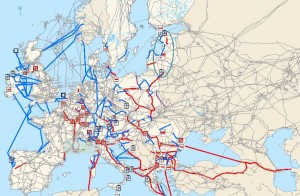Interconnection is a hot topic. “We need much better grid interconnectors around Europe to enable energy to flow across the EU”, UK Secretary of State for Energy and Climate Change, Ed Davey, recently told The Independent. Mr Davey’s Department of Energy and Climate Change (DECC) has just published More interconnection: improving energy security and lowering bills. And it was recently reported that the development of a proposed UK-Norway interconnector was at a critical stage.
Interconnectors are essential to the EU single market in energy, which is meant to be completed in 2014. They are also likely to be part of the solution to the problem of how to include non-UK providers in capacity market auctions under UK Electricity Market Reform (EMR). This in turn may be an important point for the European Commission in granting state aid approval for EMR (see EU renewable generators: time to wean them off “overcompensating” subsidies?). But while last year’s EU Regulation on cross-border infrastructure should make it easier to get interconnectors built and funded, the new DECC paper, and the Redpoint analysis that accompanies it, show very clearly why interconnection is such a difficult area for the UK.
An Interconnected Europe? Commission’s interactive map of Projects of Common Interest (electricity schemes are in blue)
Geography plays a part: it is inevitably more expensive to interconnect the UK with other EU markets than it is to interconnect many markets in Continental Europe. But that is only the start. Which markets should we connect to, and when? How big should the connections be? Who should build, own and pay them, where and when? The answers to these questions depend on a lot of other, interdependent factors that are themselves not easy to pin down: notably the future generating mix in the UK and other markets concerned, and future fossil fuel and carbon prices. DECC’s summary of Redpoint’s work notes that the possible impact on GB consumers ranges, rather neatly, from potential net benefits of around £9 billion to potential net costs of around £9.5 billion.
Perhaps the toughest questions are who should decide between the competing merits of rival interconnection schemes, and when that decision should be taken. Historically, neither the planning regime nor the regulatory network development process have had to pick winners and losers in this way. But DECC’s acknowledgement that the issue should be looked at strategically and some kind of plan formed is encouraging. They identify Ofgem’s Integrated Transmission Planning and Regulation (ITPR) project, and its ongoing consideration of Project Nemo and other proposed interconnection schemes as the proper vehicle for next steps on UK interconnection policy: watch this space.


